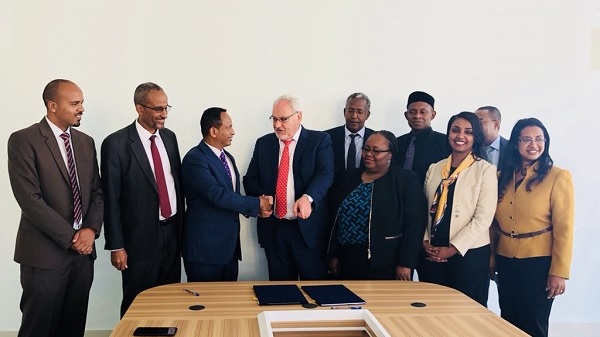
IFC CEO Philippe Le Houérou also met with key government officials and private sector leaders in Addis Ababa and visited private companies and industrial parks.
ADDIS ABABA–IFC, a member of the World Bank Group, on 17th December 2018 agreed with the National Bank of Ethiopia (NBE), the country’s central bank, to expand trade and local currency financing—part of a broader effort by IFC play a significantly larger role supporting development in Ethiopia by helping create new markets for private investors. Last week, IFC entered a multi-year partnership with the NBE to further develop Ethiopia’s nascent credit reporting system. The new agreements were signed during a six-day official visit to the country by IFC CEO Philippe Le Houérou.
The first agreement will allow IFC to support Ethiopian banks as part of a Global Trade Finance Program. Under this program, IFC will provide guarantees for trade-related payment obligations of selected Ethiopian banks. The second agreement will allow IFC to provide loans in Ethiopian birr under the local currency facility of the World Bank Group’s IDA Private Sector Window. The window allows IFC to provide support to high impact projects when local currency solutions are otherwise unavailable. An improved credit reporting system supported by IFC will facilitate access to finance for consumers, micro-enterprises, and small and medium businesses in Ethiopia.
◌ RELATED: IMF’s Sub-Saharan Africa Economic Outlook : Ethiopia’s recent policy changes will help GDP growth
“Ethiopia is emerging as one of the most attractive investment destinations in Africa and recent policy announcements are expected to further boost the country’s appeal to private investors,” said Le Houérou, “IFC’s work will help expand credit and trade and create markets, while mobilizing private financing that can become a more important factor toward diversifying Ethiopia’s economy.”
During his visit Le Houérou opened the Ethiopia Capital Markets Development Workshop, sponsored by IFC and the Ministry of Finance and Economic Development. Ethiopia aims to move toward a more market-oriented approach that promotes the efficient allocation of scarce financial resources, which will require a market-based government bond market.
Le Houérou also met with key government officials and private sector leaders in Addis Ababa and visited private companies and industrial parks. He met with President Sahle-Work Zewde, Prime Minister Abiy Ahmed, Minister of Finance and Economic Cooperation Ato Ahmed Shide, and NBE’s Governor Yinager Dessie.
Over the past five years, IFC has provided $452 million in new investment commitments in Ethiopia across agribusiness, financial, manufacturing, and other sectors, and delivers advisory services supporting leasing, financial infrastructure, and investment climate. IFC’s strategy calls for significantly expanding its investments and mobilizing new resources from other private investors. IFC has advisory and investment capacity to help the government develop innovative public-private partnership solutions that support its policy agenda. IFC investment and advisory support is expected to be leveraged to help further develop agribusiness, light manufacturing and financial markets.
Source: IFC
